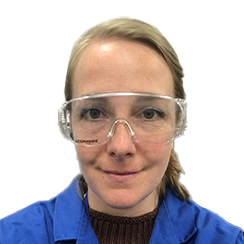Who inspired you to enter engineering?
My engineering hero is my dad. He was a telecoms engineer and, when I was little, he would sometimes take me with him on call outs. In was an awe-inspiring introduction to a secret world that enables us to go about our daily lives. I remember wandering up and down the endless aisles in the telephone exchanges, studying the masses of rainbow-coloured cables that ran from floor to ceiling. It sparked a curiosity and wonder in me that steered me to where I am today.
What advice would you share for women wanting to enter engineering?
Based on my experience I have two pieces of advice.
The first is: even if you are nervous about doing something, do it anyway – then take some time to reflect and write down how you felt before, during and afterwards. Over time, you will start to realise that you are more than up to the seemingly daunting technical challenges in engineering and that, with perseverance, you will achieve a rewarding result.
The second is: a good engineer makes decisions. Calling upon your knowledge to make an informed decision provides a starting point for action – and that’s critical if there’s to be progress towards solving a problem. You can always alter your course based on your findings – you just need to make a decision so that you can start the process.
If you practise these, it won’t be long before you start to embrace, enjoy and excel with the next new challenge that comes your way. At that point, you will have become an engineer!
What makes engineers ‘Pioneers of Progress’?
People often think of engineering as a purely formulaic and methodical process, but it’s also a creative one. The capacity to imagine is how we get the inspiration to overcome challenges in an ever changing, complex world – such as one that Smiths gave me the opportunity to lead on: designing a system to detect explosives, chemical warfare agents and toxic industrial chemicals.
If you look back to the original Renaissance man, Leonardo da Vinci, he wasn’t only an engineer, inventor and mathematician, but also the leading artist of his age. I studied art A-Level before becoming an engineer and I believe there’s a lot that we can learn from art in engineering.
The unique combination of creative skills, technical knowledge, logical thinking and systematic approach you’ll develop as an engineer is what will help you progress technology and processes that will positively impact our world – and what will make you a very valuable employee in any industry you want to work in.
Career path
- BTec Diploma in Art and Design
- Apprenticeship scheme at Smiths Detection, including part time study to HNC level Mechanical Engineering
- Manufacturing Engineer at Smiths Detection
- Part-time study for a Bachelor’s degree in Mechanical Engineering Design – supported by Smiths
- Mechanical Design Engineer at Smiths Detection
- Part-time study for a Master’s degree in Mechanical Engineering – supported by Smiths
- Senior Mechanical Design Engineer at Smiths Detection


